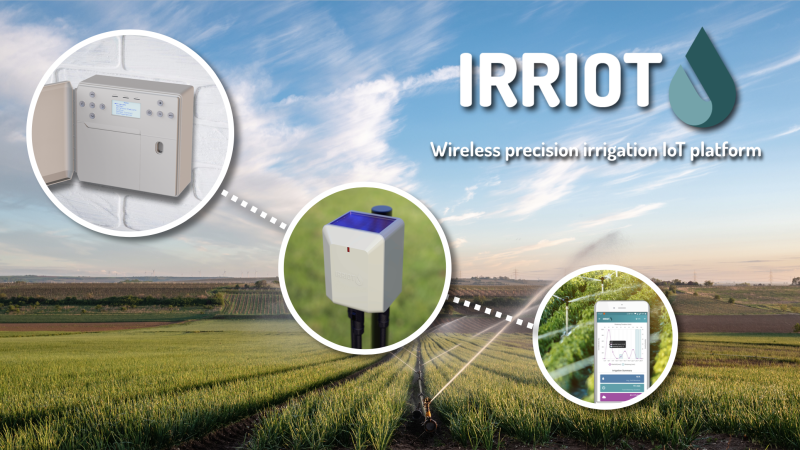Swedish smart irrigation start-up uses the Internet of Things to save water and boost crop yields
Sweden’s IRRIOT, which stands for Irrigation Internet of Things, is a Swedish company that has set out to change the way farmers water their fields.
“Literally what we do is put a brain on top of an irrigation system,” says Johan Wendt, IRRIOT’s chief marketing officer. “This allows our users to save up to 50% of the water for irrigation and increase crop yields by as much as 30%.”
The idea of the Internet of Things is spreading rapidly across many industries and sectors. In a nutshell, it means adding sensors to a network of otherwise inanimate objects, connecting them so that they can share data with each other and a base, and then be monitored and controlled from anywhere.
IRRIOT applies this idea to drip irrigation systems. Sensors in the field monitor the temperature, soil moisture, even the pH level of the soil. They send that information via a radio signal to a remote terminal unit in the field, which then sends it to a controller, which is essentially a computer. The remote terminal also opens and closes the valves on the irrigation system. The third part of the system is cloud software, which Johan describes as the intelligence that processes the data and knows when to send the correct commands to the controller.
“We live in a world with global food and water shortages, and we need to produce more food than ever,” Johan says. “Meanwhile, 70% of the world’s freshwater consumption goes to the agricultural sector, and much of it is wasted”.
Invented for a garden
IRRIOT took part in the 2021 Social Innovation Tournament, which is organised by the European Investment Bank Institute to promote creative responses to societal problems. The small business was one of 15 finalists selected from an outstanding group of 280 candidates in 28 countries. The Social Innovation Tournament recognises and supports the best European social entrepreneurs, promoting and rewarding innovative ideas that have social, ethical or environmental impact.
The IRRIOT system was created by another company co-founder and Chief Technology Officer Mikhail Soloviev, an engineer who worked for many years in telecommunications at Ericsson. He came up with the concept because he wanted to find a way to water his garden remotely when he went on holiday.
“He showed it to me and our third co-founder and we liked the idea so much we started IRRIOT around it,” Johan says. “We realised there was nothing out there like it.” The company was founded in 2017.
To date, IRRIOT has some 100 installations in use in 12 countries covering about 1 500 hectares of fields, but the majority of its clients thus far are in Sweden. Johan says the company is currently installing a bigger system in Egypt that by itself will cover 3 000 to 4 000 hectares.

For the most part, irrigation systems are either manually controlled or set with timers. Some advanced systems involve a network of buried cable to relay information from sensors, a technique that has a larger environmental impact because of the wire and plastic, and the energy used to create and deploy them.
Next generation already in works
While the pandemic made 2020 a very difficult year for IRRIOT, in part because agricultural trade shows were closed down and because of supply chain issues, 2021 has seen a lot of growth, Johan says. “We’re hoping to have 400,000 to 500,000 euros in sales by the end of the year.”
The company is developing an even more advanced system that, Johan explains, is like adding a nervous system to the IRRIOT setup. “You know when I pinch my cheek, the nervous system sends electromagnetic impulses to my brain telling me that I have a stress,” he says. “The same thing goes for any living thing, including plants. If they are being attacked by a certain bug or are low on nutrition, they will send out electromagnetic impulses.”
IRRIOT is working with a Swiss sensor-maker that specialises in harnessing and filtering those plant signals. “By integrating those sensors, we’ll create a system where the plant can say ‘Whoa, I’m a little bit thirsty’ or it could be low on nitrogen.” Then the IRRIOT system would send out the right amount of that nutrient.
Johan said IRRIOT hopes to have this system commercially available by the end of 2024. For the moment, the company has two pilot installations on strawberry fields. “We call this a bio-intelligent irrigation automation system, where the plants will literally be able to irrigate themselves.”
